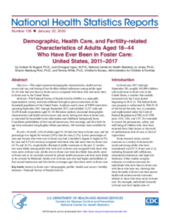This page contains documents and other resources related to children's care in the Americas. Browse resources by region, country, or category.
Displaying 1061 - 1070 of 3191
In this paper, the authors examined if high socio-economic status (SES) of families had an effect on youth’s adjustment by comparing 226 internationally adopted female Chinese youth who experienced pre-adoption institutionalization with 1059 non-adopted Chinese peers living in China, as well as 209 non-adopted American peers.
This report presents demographic characteristics, health service access and use, and timing of key fertility-related milestones among adults aged 18–44 who had ever been in foster care as compared with those who had never been in foster care in the United States.
This article from the Associated Press reviews some key findings from a recent analysis on foster care outcomes, compiled by researchers from the U.S. National Center for Health Statistics and the Department of Health and Human Services’ Children’s Bureau.
According to this article from the International Business Times, the government of Haiti "is pushing to deinstitutionalize children so as to avoid the darkest sides of orphanage life -- trafficking of kids or even worse abuse."
This study examined how foster parents worked together to parent foster children, how they described their roles and involvement with their foster children, how fostering impacted their coparenting and couple relationship, and their experiences and needs of working together with and within the foster care system.
The purpose of the study was to evaluate the associations between child maltreatment, cognitive schemas of disconnection/rejection reported in emerging adulthood, and social support perceived in emerging adulthood among young women who have exited placements in residential care.
This study explored the impact of sociosexualization and sexual identity development on the sexual well-being of youth formerly in the foster care system.
El presente llamado se realiza en el marco del convenio de cooperación vigente entre el Instituto Nacional de las Mujeres del Ministerio de Desarrollo Social (Inmujeres-MIDES) y el Fondo de las Naciones Unidas para la Infancia, UNICEF, cuyo contenido refiere a la generación de conocimiento sobre Violencia Basada en Género (VBG) e Infancia.
This article aims to review briefly the broader social, historical, and structural contexts of mandated reporting and the linked phenomena of parenting surveillance and the forced separation of families of color in the U.S.
In the current study, the authors identify specific child protective service experiences and mental and behavioral health characteristics that are predictive of moving from a family based foster placement to a congregate care placement.


